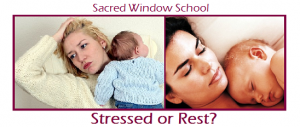 The stress hormone, cortisol, is Ma Nature’s way of taking care of Baby, no matter what, and research shows it runs high for about 10 days after birth. Natural? Yes. So let it be? Please, no! Once good support is in place, cortisol levels naturally come down before 10 days, and mothers do most of their mothering best with low stress. In fact, stress hormones generally work opposite of the love and nurturing hormones.
The stress hormone, cortisol, is Ma Nature’s way of taking care of Baby, no matter what, and research shows it runs high for about 10 days after birth. Natural? Yes. So let it be? Please, no! Once good support is in place, cortisol levels naturally come down before 10 days, and mothers do most of their mothering best with low stress. In fact, stress hormones generally work opposite of the love and nurturing hormones.
What’s best for rest?
Recently, a client had trouble sitting down when I first arrived for her postpartum care; in fact she wanted to help me or serve me something. I told her I would need a few minutes to set up, to please enjoy her few minutes – just sit and relax with her visiting mom, and then I’d come sit and talk for a few minutes with them. Baby was sleeping nearby. This dear mama could not get herself to sit. I knew then we had some unwinding to do. I often remind mothers they are in training — to take rest in the betweens and be nurtured when they can!
It took several days actually, before she fell asleep during her nap. This woman was high risk for postpartum depression (PPD), having been on antidepressants until a few months before conceiving. Yet as many of you have witnessed, even on the first day of cooking and massage the stress started to melt from her face and emotions. The willpower she so barely could hold together at first – even her speech was broken – turned into trust and surrender into her own nature, layer by layer over those few days of care. At first it was unconscious, and gradually she came to understand.
** When our clients have been through a rough surgery or baby has been in the hospital for extra needs, we can really see cortisol in action. It will both support them, and create problems. You will see mothers not realizing where this energy is coming from, and assuming they have more to draw on than they can sustain, making choices to do too much too soon. Cortisol is why Mama seems so strong – able to go without sleep, walk down the hall after a birth which damaged her tush, go back and forth to the hospital if baby is in NICU instead of napping, and generally have unbelieveable resources. It is also a big reason why she gets hot flashes, why everyone thinks she doesn’t need much help, and why a few days later, there is such a crash. Multiple physical and emotional challenges tend to come up as a result … do I have stories to tell you!
Where do those resources come from? Cortisol mobilizes blood sugar and adrenal strength, and puts rest and digest on the back burner. That means ability to regenerate is not the priority, nor is milk production, or even the love hormones like oxytocin, so important for bonding. Depletion of resources means mama needs rejuvenation therapies. High stress as a hormonal experience can often be avoided or mitigated in a ‘normal’ birth. When stress is unavoidable due to crisis, there are many stress reducing choices she can make to help recovery. What makes it not so plain and simple is limited understanding of the impact of choices.
What are those choices? Food, rest and touch play a big role here. Be ready to support them with extra attention to rest and therapies which gently, repetitively remind the body-mind what rest feels like! That’s different from saying, go nap while baby naps. Sometimes that reminder is enough, but too often, it is not. Vata/pitta or pitta/vata moms may not actually know what true rest is by nature. So, they’ll often need to be reminded. In fact, repeatedly, in various ways is the truth of it and the nature of the vata component.
So, just in case you don’t know (or have forgotten), rest has these qualities: it’s warm, cozy, protected, simple, and quiet. Foods that feed and support rest are oily and nourishing especially with sweet taste and easily digested carbs and proteins. Repetitive, oily, simple, loving touch which is matter of fact and steady, and not talkative is best for rest.
Ayurvedic medicine advises 42 days of specialized massage for mama along with specific dietary measures to strengthen and rejuvenate mom and babe. And yes, we Ayurvedic types have a sanskrit word for this: it’s called “vata” reduction and “brimhana chikitsa.” Because exercise is contraindicated, ayurvedic massage also does some of the work of moving lymph and toning the tissues — and hormones. Warm oil massage increases body chemicals we like called neurotransmitters.. And the classic postpartum diet, which stabilizes, grounds, gives ready energy and long lasting fuel for easy rebuilding and emotional comforting all bring down cortisol too. It is a big reason Ayurvedic therapies work so well — they bring down cortisol — even though there’s no Sanskrit word for that.
